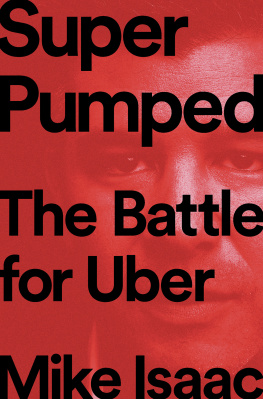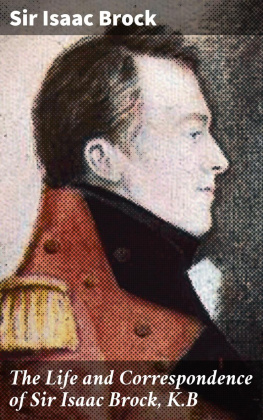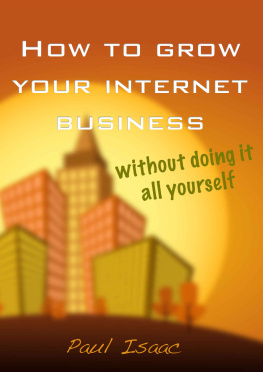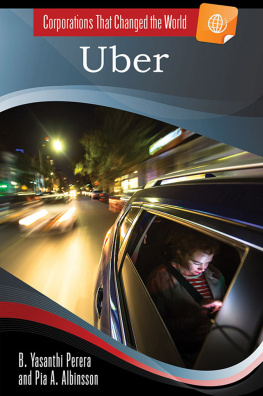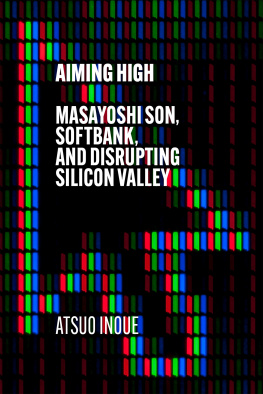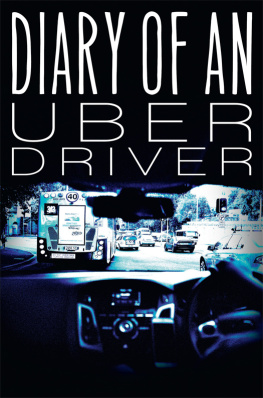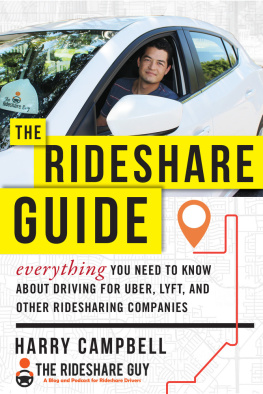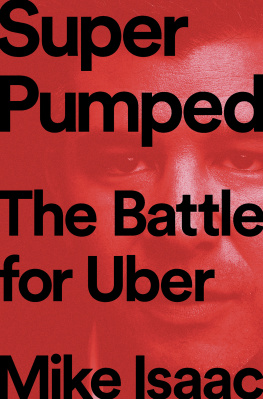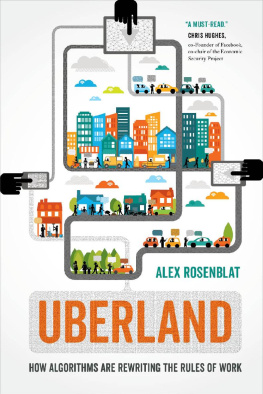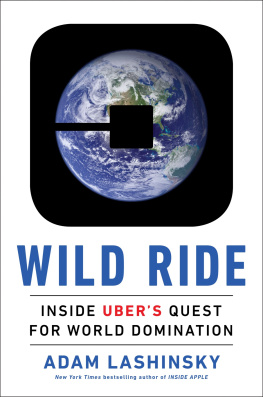
Publisher's Notice
Page numbers listed in the ebook correspond to the print edition of this book. You can use your devices search function to locate particular terms in the text.
SUPER PUMPED
THE BATTLE FOR UBER
MIKE ISAAC

Copyright 2019 by Mike Isaac
All rights reserved
Printed in the United States of America
First Edition
For information about permission to reproduce selections from this book, write to
Permissions, W. W. Norton & Company, Inc., 500 Fifth Avenue, New York, NY 10110
For information about special discounts for bulk purchases, please contact W. W. Norton Special Sales at specialsales@wwnorton.com or 800-233-4830
Book design by Lovedog Studio
Production manager: Anna Oler
Jacket design by Pete Garceau
Jacket photograph Stephen Voss/Redux
ISBN 978-0-393-65224-6
ISBN 978-0-393-65225-3(ebk)
W. W. Norton & Company, Inc., 500 Fifth Avenue, New York, N.Y. 10110
www.wwnorton.com
W. W. Norton & Company Ltd., 15 Carlisle Street, London W1D 3BS
For Sarah and Bruna
You must know there are two ways of contesting, the one by the law, the other by force; the first method is proper to men, the second to beasts; but because the first is frequently not sufficient, it is necessary to have recourse to the second.
NICCOL MACHIAVELLI, 1513
Being super pumped gives us super powers, turning the hardest problems into amazing opportunities to do something great.
TRAVIS KALANICK, 2015
CONTENTS
No one wanted to walk home that night.
It was winter in Portland, 2014, cold enough to need a heavy jacket. Downtown traffic was thick with students, commuters, and holiday shoppers buying gifts. It had snowed earlier in the week; the streets were still slick with rain and melted flurries. White, flickering Christmas lights lined the trees along Broadway downtown, a festive backdrop for the holiday season. But it wasnt a good night to be waiting around for a bus. The local transportation officers stood outside in the colddamp, bored, and annoyedtrying catch a ride.
The officers werent looking for a cab home. They worked for the Portland Bureau of Transportation and had a mandate: Find and stop anyone driving for Uber, the fast-growing ride-hailing startup. After months of trying to work with city officials to make the service legal in the city, Uber had thrown negotiations out the window. The service was launching that evening, without the bureaus approval.
For Uber, it was business as usual. Since 2009, the company had faced off against legislators, police officers, taxi operators and owners, transportation unions. In the eyes of Travis Kalanick, Ubers co-founder and chief executive, the entire system was rigged against startups like his. Like many in Silicon Valley, he believed in the transformative power of technology. His service harnessed the incredible powers of codesmartphones, data analysis, real-time GPS readingsto improve peoples lives, to make services more efficient, to connect people who wanted to buy things with people who wanted to sell them, to make society a better place. He grew frustrated by people with cautious minds, who wanted to uphold old systems, old structures, old ways of thinking. The corrupt institutions that controlled and upheld the taxi industry had been built in the nineteenth and twentieth centuries, he thought. Uber was here to disrupt their outmoded ideas and usher in the twenty-first. Nevertheless, transportation officials were beholden to legislators, and legislators were beholden to donors and supporters. And those donors often included drivers unions and Big Taxi, the groups who wanted Uber to fail.
Uber had already tried the nice-guy approach in Portland. Twenty-four hours before, Kalanick had dispatched David Plouffe, an expert political strategist, to smooth things over with city transportation officials. Plouffe was a silver-tongued creature of politics. Many believed his mastery had helped Barack Obama clinch the presidency in 2008. Plouffe knew exactly the right notes to hit with local politicians. He called Charlie Hales, Portlands affable mayor, to brief him on Ubers next steps. Hales took the call in an office in City Hall, joined by Steve Novick, his transportation commissioner.
If Hales was a nice guy, Novick was his enforcer. Standing four feet, nine inches tall, with thick glasses and a voice that pitched steadily higher as he got angry, Novick was a bulldog. The son of a waitress and a New Jersey union organizer, Novick was born without a left hand and missing fibula bones in both of his legs, disabilities that enhanced his pugilistic spirit. After graduating from the University of Oregon with his bachelors degree at eighteen years old, he went on to earn a Harvard law degree by the age of twenty-one. He had a sense of humor, too: in past campaign advertisements, Novick branded himself The Fighter with the Hard Left Hooka reference to the metal hook-shaped prosthesis that capped his left arm.
Plouffe opened talks with a friendly overture, letting the two local politicians know that Uber had waited long enough, and with a folksy, familiar tone in his voicea classic Plouffe touchsaid Uber was planning a launch downtown the next day.
Well, guys, were already in a number of suburbs outside of Portland, and theres just so much pent up demand for our service in your great city, Plouffe said. Ubers pitch since Plouffe came aboard was a smart one, populist in tone. The service was a way for individuals to earn money using their own cars, on their own terms, setting their own schedule. It would reduce the number of drunk drivers on the road, improving city safety, and passengers would have another convenient option in places where public transportation wasnt fully mature. Were really trying to provide a service to your citizens here, he went on.
Novick wasnt having it. Mr. Plouffe, announcing that youre going to break the law is not civil, he said, his hook digging into the mayors desk in frustration. This is not about whether we should have a thoughtful conversation about changing taxi regulations. This is about one company thinking it is above the law.
Novick and Hales had tried to tell Uber for months that the company couldnt just roll into town and set up shop just because it was ready to do so. The taxi union would have a conniption. Furthermore, there were existing regulations that prevented some of Ubers services from operating. And since ride-hailing was such a new phenomenon, much of Portlands existing rules didnt address the practicelaws for Uber just hadnt been written yet. Uber would have to wait.
It wasnt as if Novick and Hales were being inflexible. Hales had promised to overhaul transportation regulations upon entering office. Just a few weeks prior, Portland was one of the first cities in the country to draft rules that allowed Airbnb, the home-sharing startup, to operate legally within the citys confines. And for more than a year, the hope was that such a forward-thinking city could do the same with ride-sharing.
But Portlands good intentions werent delivering on Kalanicks time frame. Now, the two sides found themselves at an impasse. Get your fucking company out of our city! Novick yelled into the speaker phone. Plouffe, the charmer, was silent.
Ubers nice-guy approach hadnt worked. But it wasnt designed to. Over the previous five years, the company had grown from a startup employing a couple of techies in a San Francisco apartment to a burgeoning global behemoth operating in hundreds of cities across the world. It had done so by systematically moving from city to city, sending a strike team of employees to recruit hundreds of drivers, blitz smartphone users with coupons for free rides, and create a marketplace where drivers were picking up passengers faster than the blindsided local authorities could possibly track or control. This was the plan for Portland as well, no matter what the mayor and his enforcer had to say. And Travis Kalanick was tired of waiting.
Next page
